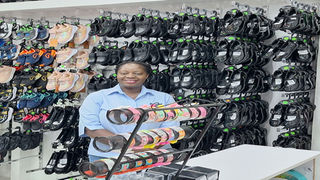
Ms Pauline Mujaasi, the proprietor of Skoolies. PHOTO/ JOAN SALMON
|Prosper
Prime
Asiimwe: Rally behind women entrepreneurs
What you need to know:
- Women in business are the majority in informal, small, and medium-sized trade. But even with this benefit in numbers, they are impeded by a cocktail of challenges.
- Prosper magazine’s Deogratius Wamala had a one-on-one with Mr Stephen Asiimwe, the Private Sector Foundation Uganda chief executive officer on how they plan to support women entrepreneurs.
You lead an organisation that is the engine of the private sector. Have you tried to improve women-led businesses, especially those in the informal sector?
Rightly said, we have for years pushed private sector development by supporting business in different aspects. We have a lot of programmes, but to focus on your question, we have the annual PSFU Women’s Day Katale that carries a series of initiatives to support women entrepreneurs.
What is it and why would women be interested in it?
As earlier said, we have a membership of about 330 business associations and corporate companies. As part of our strategic plan, we are an enabler of business development. We do this through policy and advocacy, offering business development support, capacity building, and supporting businesses to understand how to operate.
Under these associations, we have micro, small, medium, and large. Micro is dominated by women. Small is a lot of women, but the bigger you go the less the women.
We have interrogated all this and created special-purpose vehicles such as the PSFU Women’s Day Katale that we believe will, in the immediate help women to stay in business, but also support their growth into larger and sustainable businesses.
As PSFU, we cannot say we are growing businesses when a significant part of our constituency is stagnated on the low pyramid. It is not about numbers. It is about the quality of the numbers.

Mr Stephen Asiimwe, the Private Sector Foundation Uganda chief executive officer.
The Katale coincides with World International Women’s Day because we want it to be our celebration of women entrepreneurship by creating a marketplace of innovation, networking, cross-cutting demand, and supply opportunities, doing business better, and training.
In 2022, we held the first Katale in Luwero. It had a turn-up of over 100 women-founded and women-led businesses. We saw women creating unique innovations and we said we want this to go on. So, that is how it has become an annual event, with the last one held here in Kampala, while the upcoming one will be held in Jinja.
What has stood out for you?
There is a lot of innovation among women-led or founded businesses. However, they also have challenges that are unique to all of them. Cost and access to finance, markets and networks stand out as the biggest challenges. We cannot solve all these in one go but we have got to engage in a process that lifts some while others wait for their opportunity.
In the two editions of Katale, women have walked away with knowledge, opportunities and a platform to improve their businesses.
Therefore, as PSFU, we are excited because we see an opportunity to grow women businesses to a level where they are comfortable to adopt the concept of value addition.
Of all cities in the East why have you chosen Jinja for the third edition?
We have had events in West Nile and Mbale in the last two years. So, our affirmative action makes us believe it is fair to spread out functions across the country.
For this year’s Katale, we planned to choose a city in the east. We wanted to ‘piggy-ride’ on the new enthusiasm of the new Queen of Busoga, her Majesty the Inhebantu. She is new, fresh and popular. She is the biggest, youngest woman influencer in the country now. The third season of the Katale, running in March coincides with the end of her honeymoon. Culturally, she has to go through a honeymoon process which, among other things, stops her from appearing in public until a certain number of days which are done now.
The PSFU Katale is thus a great event for the people of Busoga to engage with the Inhebantu now that her honeymoon is done.
Further, Busoga and Jinja in particular has a huge population of unemployed women. We want to use the Katale to catalyse the outreach for businesses there. Besides, Jinja is a town on the run; a Tourism city, a source of the Nile, and once upon a time, the biggest manufacturing centre in the country. It is a good place to support the transformation of women and the girl child.

Ms Anthea Ibembe the founder of APA Kisubi Tea shares her story at matchmaking session. PHOTO/JOAN SALMON
Jinja is a tourism hub. How can the tourism sector tap into the Katale initiative?
Many houses next to the River Nile have been converted into boutiques, hotels or guest houses. After Nyege Nyege, the Coronation and the Royal wedding, the Women’s Day Katale will be the next biggest event in Jinja and Busoga region.
Thus, people should prepare to receive visitors coming in for the Katale, be part of it by exhibiting the different products and for those in tourism, create packages for the visitors, among which include mini trips to the waterfalls, bungee jumping and visiting the source of the Nile, among others.
We understand the power the chapati and rolex delicacy has in Jinja, Uganda and the world at large. Does it have an opportunity in the Katale?
While there are several theories around the origin of Rolex, the proprietor of Rolex is a Jinja person. I agree that the people of Jinja must showcase their chapati and Rolex making skills as this is a sub-sector that employs so many young people. But Jinja has so much more to offer. So, use the Katale to catapult your business to higher heights.




